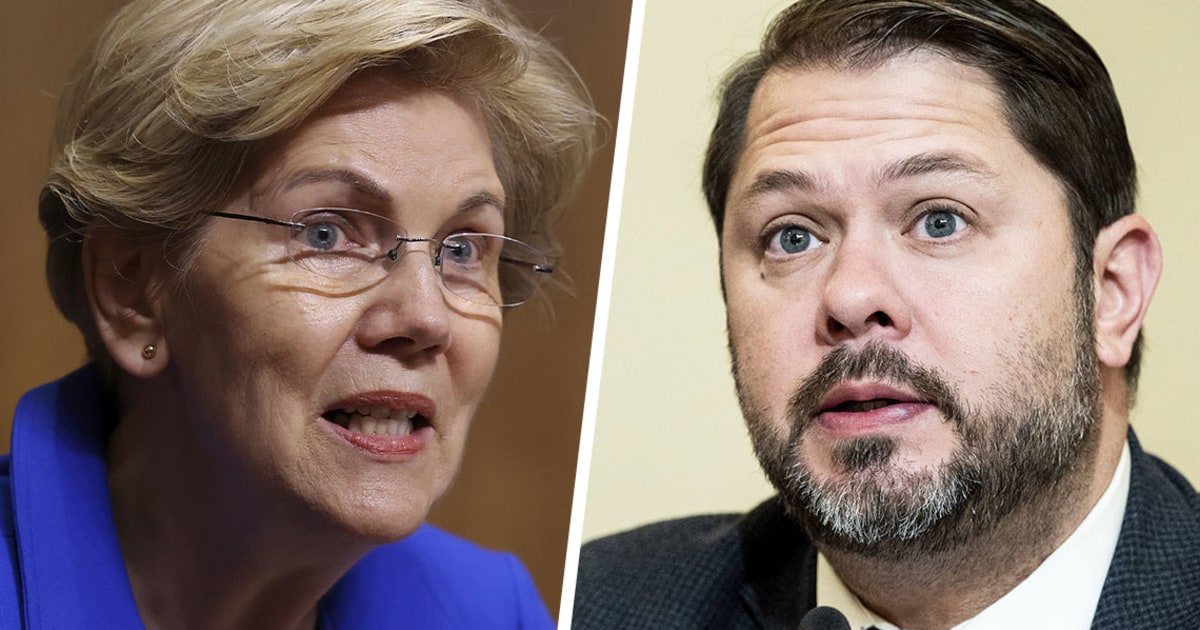
WASHINGTON — When House Republicans passed President Donald Trump’s multitrillion-dollar tax and spending package on a party-line vote of 215-214, some Democrats couldn’t help but notice that three safe blue seats in their ranks were empty after those lawmakers recently died in their 70s.
“Imagine if one of the older and sicker Dems would’ve retired instead of died in office and what that would’ve meant for millions of people,” Rebecca Katz, a consultant who has advised successful Democratic Senate candidates in two swing states over the last three years, said on X.
Even as some Democrats conceded the GOP bill may ultimately have passed anyway, the moment quickly reignited an intraparty debate about gerontocracy and aging politicians clinging to power — or seeking promotions — while they show signs of decline or battle grave health issues. The clash has been fueled by an ongoing reckoning over then-President Joe Biden’s 2023 decision to run for re-election before dropping out after a disastrous June 2024 debate in which the 81-year-old incumbent struggled to craft sentences.
The cascade of events has bolstered a generational argument, once limited to a narrow group of young progressives, that is now gaining traction inside the Democratic Party, including among seasoned party operatives who say the sentiment is growing.
“You get accused of ageism when you start having this conversation sometimes. But it’s like, look at an actuarial table,” said Mike Nellis, a veteran Democratic strategist who has worked as an adviser to former Vice President Kamala Harris. “It is a fair criticism to say that we need people to walk away. We need people to know when it’s your moment to go off into the sunset.”
“And no, the debate is not going to go away,” he said.
The clash is even evident inside the ranks of the Democratic National Committee in the form of recently elected Vice Chair David Hogg, a prominent 25-year-old gun safety activist who has called for challenging “out-of-touch” and “ineffective” lawmakers through primaries in solidly Democratic seats.
“We have empowered the cruelty of Republicans and handed them an expanded majority because elderly Democratic leaders refused to step down. It is unconscionable,” Hogg told NBC News. “Politicians only respond to incentives. That means we need to create a set of dynamics where they decide it is in their best interests to retire, and that includes primaries.”
Two Republicans missed the vote early Thursday — and if they had voted, three additional Democratic “no” votes could have fought it to a tie, blocking the bill, at least at that moment. The GOP would have had to win the votes of one member who voted “present” or flip one of the two who voted “no” on the bill.
Hogg speculated that Republicans would probably “have figured out a way to pass it if it failed” due to a tie vote. But he said that’s no excuse for Democrats to make their task easier.
“It is undeniable, though, that with less Democratic members it gives Trump greater ability to pass what he wants through Congress. And this never had to happen,” Hogg said, adding that it is “unacceptable” when Democrats spend tens of millions of dollars to win swing districts but do “nothing to get sick, older members to step down, and then we lose seats because of it.”
One of the three vacancies was the Virginia seat formerly held by Rep. Gerry Connolly, who announced two days after winning re-election in November 2024 that he had been diagnosed with cancer of the esophagus; he was soon chosen by Democrats to be the ranking member on the Oversight Committee. He died on May 21 at age 75. Another was Rep. Raúl Grijalva, D-Ariz., who died at 77 two months ago after treatment for lung cancer, a diagnosis he announced in April 2024, before winning re-election for the final time. The third was Rep. Sylvester Turner, D-Texas, who died of a medical emergency in March at 70, after previously battling bone cancer.
“The fact that the margin was so close makes this so frustrating. Millions of people are going to lose their health care,” said Amanda Litman, the president of the group Run for Something and author of “When We’re in Charge: The Next Generation’s Guide to Leadership.”
Litman and others note that they aren’t calling for lawmakers to be automatically thrown out after a certain age, but they do want to see them face challenges and external pressure to prove why they should keep serving.
“We are protecting a system that has privileged seniority and entitlement over efficacy,” she said, adding: “The system that protected Joe Biden and the system that protects our elected officials in Congress is the same one,” describing it as a mix of politicians’ egos and the acquiescence of staffers and party operatives who should know better.
Litman responded to critics who say Democrats should focus on blaming Republicans rather than turning their anger within, saying that Biden’s re-election effort and the issues in the House taught her the party won’t evolve without pressure.
“This conversation has to happen in public, because we’ve now seen it’s not happening in private,” she said.
Ashwani Jain, a 35-year-old former Obama administration official and unsuccessful 2024 House candidate, said the Democratic Party is “too focused on protecting the old guard — propping up aging politicians while sidelining the next generation of leaders.”
“The establishment clings to a model that prioritizes seniority, fundraising and insider connections over fresh ideas and grassroots energy,” said Jain, who wrote the new book “Project 2027: A Progressive Blueprint to Reclaim Congress and Protect Democracy.”
“It’s not about ageism — it’s about urgency,” he said.
Another factor driving the conversation is the widespread belief in both parties that House majorities are likely to be narrow for the foreseeable future, which means that every seat can have national consequences.
“Members often continue to run for the right reasons — there’s always unfinished business in public service — but continuing to run with major illnesses leads to painful ends to otherwise accomplished careers,” said Ashley Schapitl, a former top communicator for Democratic senators and the Treasury Department. “Congressional margins have been tight since the 2020 election, making every seat count more than in previous years in determining the outcomes of legislative fights that have monumental consequences for the American people.”
Nellis said aging politicians eventually become “out of step culturally” and, in refusing to step down, are “preventing future leaders from stepping up, and it creates a cascading problem” by freezing opportunities down the ladder. He said generational change would also mitigate the party’s political struggles to communicate in the modern media.
“We have a lot of leaders who are very smart, care passionately about the issues, but they can’t go do the media the way that we need them to,” Nellis said. “And right now what I need is a lot more politicians that can sit on the podcast for three hours and talk about a bunch of issues and get into weird, goofy personal stuff and sit with Joe Rogan. And I don’t have a lot of those.”
It isn’t just politicians, he added.
“There’s a generational change problem throughout the Democratic Party,” Nellis said, calling for new consultants, campaign managers, communicators and surrogates, in addition to new legislators. “So that generation change — it is actively happening inside the Democratic Party at every level.”








